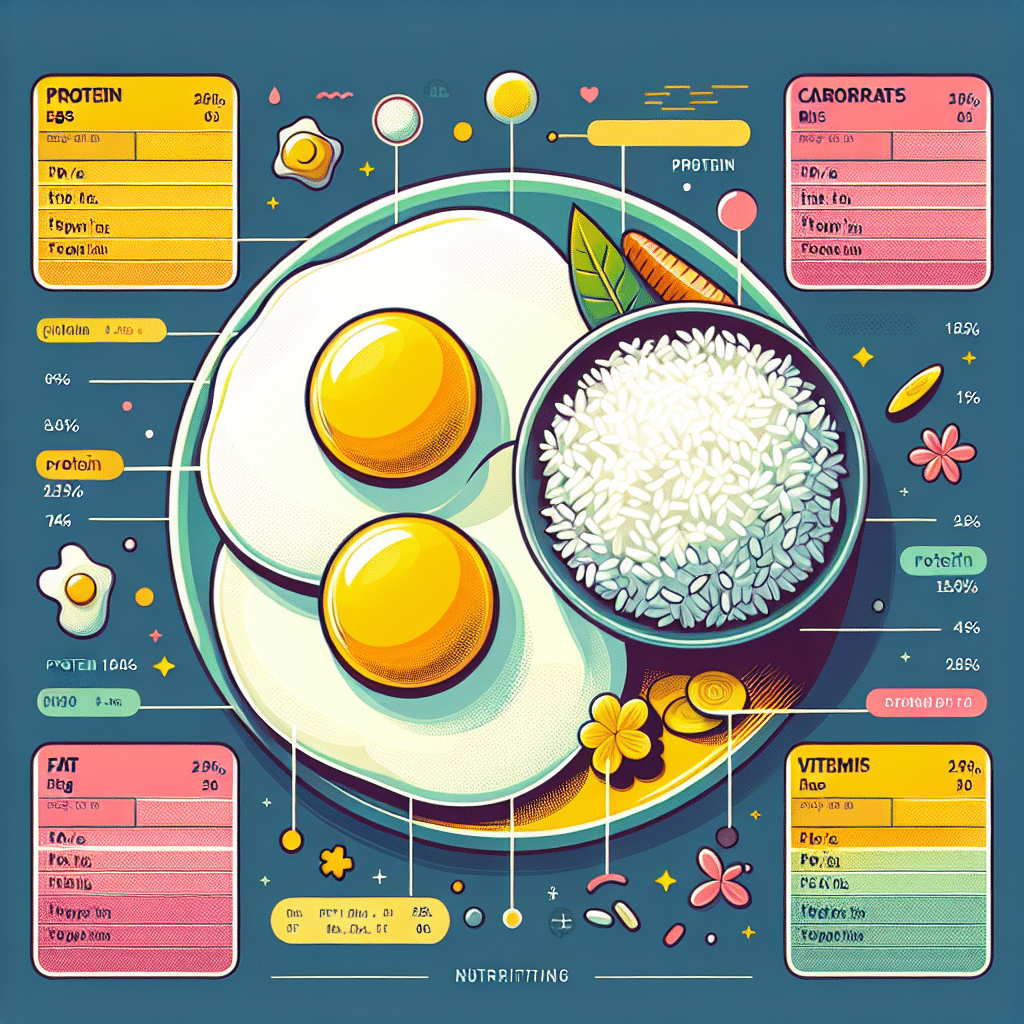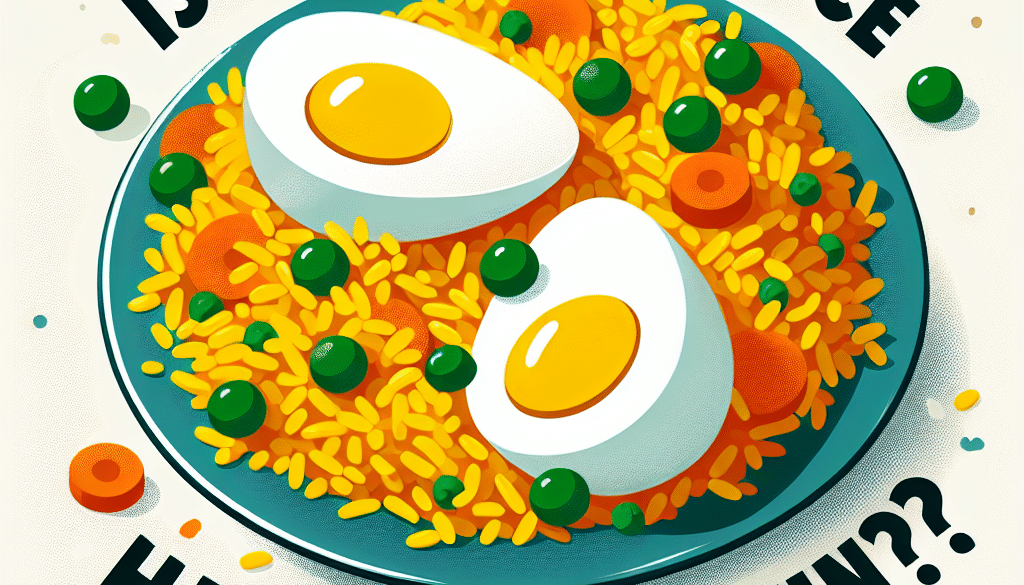Is Eggs And Rice High In Protein?
-
Table of Contents
- Eggs and Rice: A High-Protein Duo for Your Diet
- The Protein Content of Eggs
- The Protein Content of Rice
- Combining Eggs and Rice for a Protein Boost
- Case Studies and Examples
- Protein in Different Types of Rice
- Maximizing Protein Intake with Eggs and Rice
- Conclusion: The Role of Eggs and Rice in a High-Protein Diet
- Enhance Your Protein Intake with ETprotein’s Products
Eggs and Rice: A High-Protein Duo for Your Diet

When it comes to building a diet that supports muscle growth, weight management, and overall health, protein is a critical macronutrient. It’s essential for the repair and maintenance of tissues, the production of enzymes and hormones, and it also plays a role in satiety. Two common foods that are often included in meals across various cultures are eggs and rice. But the question remains: Are eggs and rice high in protein? This article delves into the nutritional profiles of these foods and explores their role in a high-protein diet.
The Protein Content of Eggs
Eggs are widely regarded as a powerhouse of nutrition. They are an excellent source of high-quality protein, containing all nine essential amino acids that the body cannot synthesize on its own. A single large egg contains about 6 to 7 grams of protein, with the majority of it located in the egg white. The egg white of one large egg provides approximately 3.6 grams of protein, while the yolk offers about 2.7 grams.
- Complete Protein Source: Eggs provide a complete amino acid profile, making them an excellent protein source for muscle repair and growth.
- Biological Value: Eggs have one of the highest biological values—a measure of protein quality—among all foods, which means the protein in eggs is efficiently utilized by the body.
The Protein Content of Rice
Rice, particularly brown rice, is often considered a good plant-based protein source. While not as protein-dense as eggs, rice does contribute to protein intake. A cup of cooked brown rice contains about 5 grams of protein. However, it’s important to note that rice is not a complete protein, as it lacks adequate amounts of some essential amino acids, particularly lysine.
- Plant-Based Protein: Rice is a suitable protein source for vegetarians and vegans, though it should be combined with other protein sources to ensure a complete amino acid profile.
- Whole Grain Benefits: Brown rice, being a whole grain, also provides additional nutrients such as fiber, vitamins, and minerals.
Combining Eggs and Rice for a Protein Boost
When eggs and rice are consumed together, they can create a meal that is relatively high in protein. The combination of animal protein from the eggs and plant protein from the rice can also ensure a more complete amino acid profile. This is particularly beneficial for those following a predominantly plant-based diet, as it can help fill the gaps in essential amino acids that plant proteins sometimes miss.
Case Studies and Examples
Many traditional dishes from around the world already combine eggs and rice to create balanced meals. For example, the popular Asian dish ‘fried rice’ often includes scrambled eggs, providing a protein-rich meal. Similarly, in Latin American cuisine, ‘arroz con huevo’ (rice with egg) is a simple yet nutritious dish that combines these two ingredients.
Protein in Different Types of Rice
Not all rice is created equal when it comes to protein content. Here’s a quick comparison:
- White Rice: A cup of cooked white rice contains about 4 grams of protein.
- Brown Rice: A cup of cooked brown rice contains about 5 grams of protein and is more nutrient-dense than white rice.
- Wild Rice: A cup of cooked wild rice contains about 6.5 grams of protein, making it a higher-protein option.
Maximizing Protein Intake with Eggs and Rice
To maximize the protein content of a meal featuring eggs and rice, consider the following tips:
- Add additional protein-rich ingredients such as lean meats, beans, or cheese to the dish.
- Use more egg whites, as they are pure protein without the fat found in yolks.
- Opt for brown or wild rice over white rice for a slight increase in protein and additional nutrients.
Conclusion: The Role of Eggs and Rice in a High-Protein Diet
In conclusion, both eggs and rice contribute to protein intake, with eggs being a high-quality, complete protein source and rice providing a modest amount of plant-based protein. When combined, they can offer a meal that is higher in protein and has a balanced amino acid profile. This combination can be particularly beneficial for those looking to increase their protein intake without relying solely on meat or other animal products.
For individuals seeking to incorporate more protein into their diets, eggs and rice are versatile ingredients that can be used in a variety of dishes. By understanding the protein content and combining these foods wisely, one can create delicious, protein-rich meals that support a healthy lifestyle.
Enhance Your Protein Intake with ETprotein’s Products
If you’re looking to supplement your diet with high-quality protein, consider ETprotein’s range of organic and vegan protein products. Their offerings include organic rice protein, pea protein, and other plant-based protein powders that are non-GMO and allergen-free. With a neutral taste and high purity levels, ETprotein’s products are ideal for boosting your protein intake in a convenient and effective way.
Whether you’re involved in sports nutrition, weight management, or simply seeking to improve your overall health, ETprotein has a protein solution to meet your needs. Their products are trusted by leading global brands and are suitable for a wide range of applications, from dietary supplements to infant formula.
To explore ETprotein’s protein offerings and how they can benefit your diet, contact them at sales(at)ETprotein.com for more information or to request a sample.
About ETprotein:
ETprotein, a reputable protein and L-(+)-Ergothioneine (EGT) Chinese factory manufacturer and supplier, is renowned for producing, stocking, exporting, and delivering the highest quality organic bulk vegan proteins and L-(+)-Ergothioneine. They include Organic rice protein, clear rice protein, pea protein, clear pea protein, watermelon seed protein, pumpkin seed protein, sunflower seed protein, mung bean protein, peanut protein, and L-(+)-Ergothioneine EGT Pharmaceutical grade, L-(+)-Ergothioneine EGT food grade, L-(+)-Ergothioneine EGT cosmetic grade, L-(+)-Ergothioneine EGT reference grade and L-(+)-Ergothioneine EGT standard. Their offerings, characterized by a neutral taste, non-GMO, allergen-free attributes, with L-(+)-Ergothioneine purity over 98%, 99%, cater to a diverse range of industries. They serve nutraceutical, pharmaceutical, cosmeceutical, veterinary, as well as food and beverage finished product distributors, traders, and manufacturers across Europe, USA, Canada, Australia, Thailand, Japan, Korea, Brazil, and Chile, among others.
ETprotein specialization includes exporting and delivering tailor-made protein powder and finished nutritional supplements. Their extensive product range covers sectors like Food and Beverage, Sports Nutrition, Weight Management, Dietary Supplements, Health and Wellness Products, and Infant Formula, ensuring comprehensive solutions to meet all your protein needs.
As a trusted company by leading global food and beverage brands and Fortune 500 companies, ETprotein reinforces China’s reputation in the global arena. For more information or to sample their products, please contact them and email sales(at)ETprotein.com today.












